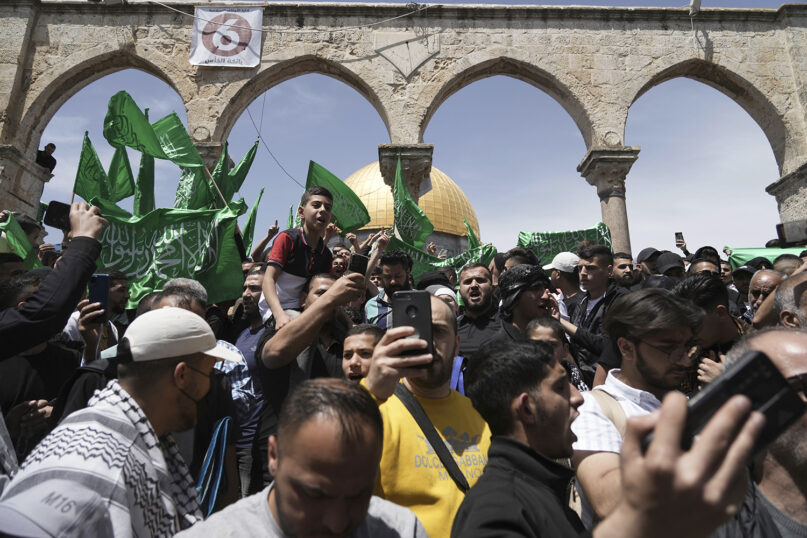(RNS) — The violence that broke out in the Al-Aqsa Mosque complex in Jerusalem the morning of April 15th has already spilled into a wider conflict, threatening to reprise last year’s 11-day missile war between Israel and Hamas.
This year’s trouble could have been avoided had respect been paid to a centuries-old understanding that rulers had adhered to until very recently.
For the Ottomans, who ruled much of the Middle East and beyond for over four centuries, the jewel of their crown was Jerusalem. Between 1535 and 1538, Sultan Suleiman rebuilt the walls of the old city of Jerusalem. Today the walls and the entire old city, the cradle of Judaism, Christianity and Islam, is a protected UNESCO World Heritage site.
As the Ottoman Empire began to weaken in the 18th century and European powers moved in, regulating worship of the faithful of the three faiths became necessary. Spurred by a conflict between the Orthodox and the Franciscan Christians over the use of the Church of the Holy Sepulcher, Sultan Osman III fashioned an agreement in 1757 aimed at regulating relations between all the faith groups that held the city dear.
The sultan’s document of principles is known to this day as the Status Quo Agreement. Even now, it details relationships between different denominations of the same faith and deals with inter-religious issues, giving specific details on nine religious sites in Jerusalem and Bethlehem.
Even after the collapse of the Ottomans at the end of World War I, the British mandate continued to respect and adhere to the Status Quo Agreement, as have the Jordanians and the Israelis since the Jewish State declared its existence in 1948. After the June 1967 War, Israel’s top rabbis further agreed that Jews would be forbidden from entering the Al-Aqsa esplanade. A sign stating as much still stands.
The reason for the ban was not only political but religious: Jews, not knowing the location of the holy of holies that was the center of the Second Temple that it is believed to have stood on the site until its destruction in 70 A.D., chose to avoid walking on what they call the Temple Mount, lest they trample on sacred ground.
In later years, radical Jewish rabbis argued that temple remnants could not underlie all of the mosque’s 144 dunum — about 36 acres — and therefore declared visits to at least some parts of the esplanade permissible.
The potential for trouble has escalated over the years, and much blood has been shed. By 2014, the Status Quo Agreement had become battered enough that U.S. Secretary of State John Kerry, meeting with Israeli Premier Benjamin Netanyahu and Jordan’s King Abdullah, whose Hashemite family are the custodians of the Holy places in Jerusalem, worked out a renewed understanding.
That understanding can be summarized in one sentence. Al-Aqsa is for Muslims to pray and for all others to visit. Visits by Jews, furthermore, are allowed only in those hours when Muslims are not at prayer, and it was understood that Jews are to visit but not to pray.
It was also noted that while small groups may visit, disruptive groups or demonstrations should not be allowed, and repeat visits should be discouraged. The idea was that only people who genuinely wanted to visit, rather than make a religious statement, would be allowed. For much of the Netanyahu administration’s 12-year tenure, it had usually prevented Jews from visiting at all during the Muslim holy month of Ramadan.
Then, in the run-up to Passover this year, hardline Jewish zealots said that they plan to sacrifice a Jewish lamb on the Temple Mount — on Islam’s third-holiest site, during Ramadan.
Israeli Prime Minister Naftali Bennett eventually promised that nothing of the sort would happen, but word of the planned sacrifice had already circulated among Palestinians and the wider Muslim world — on social media, the image of a poster promising cash prizes for any Jew who can succeed to sacrifice a lamb on the Al-Aqsa grounds had already been reforwarded a thousand times. Enraged Muslims gathered in large numbers to protect their mosque from those trying to violate the Status Quo.
But the prime minister, his governing coalition already buckling under him, needed to shore up his reputation even among his own right-wing religious-nationalist party. Instead of following the wisdom of centuries — or even his predecessor Netanyahu’s lead — he ordered the Israeli police to do what was necessary to ensure that Jews could safely “visit” during the Passover season.
History doesn’t reward such attempts to go against the Status Quo, as wiser heads seem to have realized. The Israelis announced Tuesday (April 19), at the request of the king of Jordan, that visits to the mosque during the last 10 days of Ramadan not be allowed.
Such a decision is not a copout or surrender to terror, as right-wing commentators like to say. It is a sane decision that conforms to the Status Quo and the 2014 Israeli-Jordan-U.S. agreement. The sensitivity and sanctity of religious sites must be respected, and the ideology of political leaders must be kept in check if they want to have peace and quiet.
This is the lesson of thousands of years of managing the holy places in a holy city. As a result of the need to protect and adhere to the status quo, the international community needs to create a mechanism to ensure that possibility by means of a binding security council resolution.
(Daoud Kuttab, a Palestinian journalist from Jerusalem who now lives in Jordan, is a former Ferris professor of journalism at Princeton University. He is on Twitter @daoudkuttab. The views expressed in this commentary do not necessarily reflect those of Religion News Service.)





